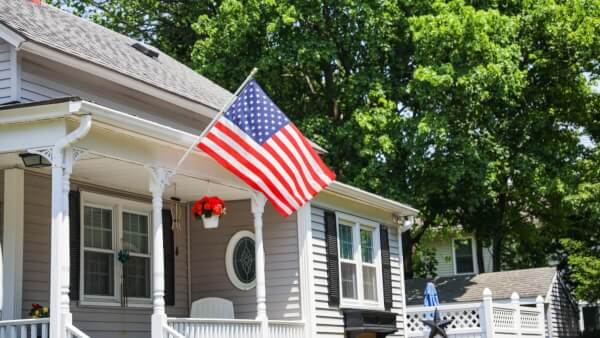Selling property in Portugal: Complete guide for UK residents
Read our comprehensive guide to selling property in Portugal, including fees, taxes, timescales and a step-by-step guide to the process.

Planning on selling a property in Switzerland? Whether it’s a holiday home chalet in the Swiss alps or an apartment in Zurich, read on.
We’ve put together a comprehensive guide for UK expats and overseas property owners on selling property in Switzerland. We’ll cover everything you need to know, including estate agent and solicitor fees, taxes and a step-by-step guide to the sales process.
And if you need a low-cost, transparent way to transfer the proceeds of your property sale back to the UK, check out the Wise account from the money services provider Wise. It’s an international alternative to a bank account that lets you manage your money in 40+ currencies including British pounds and Swiss francs.
You can send, receive and convert money at great mid-market exchange rates and low, transparent fees*. Your money is always safeguarded and you’ll also get dedicated support when sending large amount transfers.
Learn more about the Wise account 💰
If it’s your first time selling a property in Switzerland, you’ll need to get to grips with how the process works.
Let’s run through the main steps, so you know exactly what to expect.
The rules on selling property are a little different in Switzerland compared to the UK. There, you’re legally required as the seller to disclose any defects or issues to potential buyers.¹
In the UK, the onus is on each individual buyer to commission their own survey to discover any problems.
So to comply with Swiss laws, it’s recommended to get a home assessment carried out by a surveyor. This is often included as part of a professional valuation.
Depending on the results, you might want to make some improvements and repairs to the property. You’re not obliged to do this, but it could increase the property value. The only thing you are legally obligated to do is let buyers know of any unresolved issues - if they affect the value.
Before you put your property on the market, you need to make sure you have all the required paperwork.
Here’s what you should have ready:²
One of the most important is the energy certificate, as it’s mandatory in Switzerland to have this before you can sell a property. So this may be another survey you need to commission, if you don’t have a recent certificate.
The next step is to find a real estate agent to market and sell the property. It isn’t mandatory to use one, but it is advisable - especially if you’re selling a Swiss holiday home while still living in the UK, or if you’re unfamiliar with the local property market.
An agent will handle the sales process on your behalf, including taking photographs, hosting viewings, handling the paperwork and communicating with buyers. They can also arrange a professional valuation, which will help you set the purchase price.
Crucially, a Swiss agent will have the local knowledge and expertise to sell your property at a good price.
To choose an estate agent, it’s a good idea to look for English-speaking agents with experience of working with UK sellers and expats. Ideally, get a personal recommendation from someone you know who has successfully sold a Swiss property.
Otherwise, you can find a verified agent through the Swiss Real Estate Association (SVIT) or the Swiss Union of Real Estate Professionals (USPI Suisse).
Now it’s time to put your property on the market and advertise it to potential buyers.
Firstly, you might want to ‘dress’ the property ready for photos and viewings. This includes cleaning and decluttering, along with other touches recommended by your realtor.
Your estate agent will play a central role in advertising the property, but you can also list it on popular local property sites such as:
Buyers can submit offers directly to you, but it could be easier if they go through your real estate agent. They can help you negotiate with buyers and agree on a final purchase price.
In Switzerland, the contracts and other documents for property sales are drawn up by a notary. This person will also witness signatures of all legally binding documents.
Depending which Swiss canton your property is located in, you’ll either have a public notary appointed by the local authority, or you’ll need to find your own.
You might also want to appoint your own solicitor to give you advice on your Swiss property sale, and to oversee any more complicated legal and administrative aspects of the sale.
The UK Government website has a list of English-speaking property solicitors here.
Once you’ve accepted an offer from a buyer, the notary will draw up a reservation contract for both parties to sign. This is legally binding, and also involves the transfer of a deposit. At some point after this, a completion date will be set.
With the help of the notary or your solicitor, a sales contract will be drawn up and exchanged. Once both parties are happy with it, they’ll sign in the presence of a notary.
An important thing to note here is that the contract will usually be in the language of the Swiss canton your property is located in (i.e. French or German). If you’re not fluent in this language, you can have it translated at an extra cost or have your solicitor check it over.
The buyer will pay the remaining balance, you’ll hand over the keys and the property will be registered by the notary in the new buyer’s name.
| 💡 Read more: Receiving money from abroad in the UK: a how-to guide |
|---|
The right time to sell your Swiss property will largely depend on things like how much you paid for it and what prices are like in the local property market.
But more generally across the country, it could be a good time to sell. House prices have grown steadily over the last few years. In 2024, prices rose 0.7% in the third quarter of the year, with an overall increase of 2.8% compared to 2023.³
There’s also healthy demand among buyers. The recent reduction in the Swiss National Bank's (SNB) benchmark rate has made long-term mortgages more affordable, meaning more buyers may be considering entering the market.⁴
So if you bought your Swiss property at the right price, now could be an advantageous time to sell up.

On average, it takes around 6 months to sell a property in Switzerland.⁵
However, the time it takes to sell a property can vary based on a few factors, some of which will be out of your control. For example, there may be an extra legal or other complication which takes time to resolve.
It may also depend on the asking price and how fast properties are selling in the local market.
So it could take anywhere from a few weeks to a few months to complete the sale of your property.
Most of the legal parts and paperwork involved in Swiss property transactions are handled by the notary.
However, you may still want to appoint your own solicitor, making sure to choose one specialising in real estate or conveyancing work in Switzerland. They can translate documents, check over conditions of contracts, give you advice about the selling process and so much more.
This could make your property sale go more smoothly and crucially, help you avoid a costly mistake.
It’s not mandatory to have a Swiss bank account in order to sell property in the country. You may be able to use an international account or even your current account with a UK bank.
Another thing to note is that international transfers could get expensive, especially if the provider adds a margin to the exchange rate to convert your Swiss francs to British pounds. Consider checking out Wise to handle your international large transfers with mid-market exchange rates and low, transparent fees*.
One of the most crucial things you’ll want to know before selling property in Switzerland is how much it’ll cost you.
Let’s take a quick look at the main fees and taxes involved:¹
| Tax/fee name | Rate/fee |
|---|---|
| Real estate agent fees | 2% to 3% of the sale price |
| Capital gains tax | Varies between cantons |
| Deed registration fees | 1% to 1.5% |
| Legal fees | Varies |
| Notary fees | Up to 1% |
Estate agent fees in Switzerland vary depending on the area, and they’re also negotiable - so may vary between agents. But generally, you can expect to pay anywhere between 2% to 3% of the total sale price.¹
When you sell a property in Switzerland, you’ll need to pay real estate capital gains tax on any profit you make from it. So, the difference between what you paid for the property and what you sell it for, minus any fees and expenses.
The rules and rates for capital gains tax vary between cantons in Switzerland. So you’ll need to contact the local authority in the area your property is located in to find out more.⁶
If you will be reinvesting your money in a new property in Switzerland - known as a ‘replacement purchase’ - you may be exempt from the tax.⁶
Complicating things further is the fact that the UK also has rules on capital gains tax when you sell property abroad.
If you’re a UK resident and sell a Swiss holiday home, for example, you’ll need to pay the tax in the UK. However, you can potentially claim relief if you’re taxed twice, in both countries.⁷
Tax can be complex, so it’s best to get advice from a tax specialist before proceeding.
If not included in the notary’s fees, the fee for registering the deeds in the new buyer’s name is likely to be around 1% to 1.5%.¹ You’ll need to check who pays this - whether it’s you or your buyer.
If you appoint a solicitor in Switzerland, you’ll have some legal costs to pay. These can vary between solicitors and regions, and how much/what kind of work the solicitor does for you.
Lastly, there are fees for the notary’s work, which is a vital part of property transactions in Switzerland. These can amount to around 1% of the total sale price.¹
For anyone considering moving to Switzerland (or staying there if you’re a temporary resident), it’s useful to know about tax residency and how it relates to property ownership.
Buying a Swiss property doesn’t automatically make you a tax resident in Switzerland. But if you live in the property and it’s your main home, you will be considered a tax resident.
You might also fall into this category if you spend 30 days working in Switzerland, or 90 days otherwise - as long as the stay isn’t interrupted. This could mean that your property is deemed a ‘qualified abode’.⁸
This part of the law can be complicated, so it’s a good idea to get professional advice if you’re concerned about your tax obligations in either Switzerland or the UK.
Once the deal is done, you might need to work out the best way to transfer the proceeds from your Swiss property sale back home to the UK if you don’t live in Switzerland.
Here’s where Wise can help you save money and avoid those pesky hidden fees and exchange rate markups. Open a Wise account online and you can send money between Switzerland and the UK for low, transparent fees* and great mid-market exchange rates.
Here’s an overview of the main benefits for using Wise: |
|---|
|
Sources used:
Sources last checked on date: 14-Nov-2024
*Please see terms of use and product availability for your region or visit Wise fees and pricing for the most up to date pricing and fee information.
This publication is provided for general information purposes and does not constitute legal, tax or other professional advice from Wise Payments Limited or its subsidiaries and its affiliates, and it is not intended as a substitute for obtaining advice from a financial advisor or any other professional.
We make no representations, warranties or guarantees, whether expressed or implied, that the content in the publication is accurate, complete or up to date.

Read our comprehensive guide to selling property in Portugal, including fees, taxes, timescales and a step-by-step guide to the process.

Read our comprehensive guide to selling property in Malta, including fees, taxes, timescales and a step-by-step guide to the process.

Read our comprehensive guide to selling property in Australia, including fees, taxes, timescales and a step-by-step guide to the process.

Read our comprehensive guide to buying property in the US as a foreigner, including average prices, fees, taxes and where to start house hunting.

Read our comprehensive guide to buying property in Vietnam as a foreigner, including average prices, fees, taxes and where to start house hunting.

Read our comprehensive guide to buying property in Egypt as a foreigner, including average prices, fees, taxes and where to start house hunting.